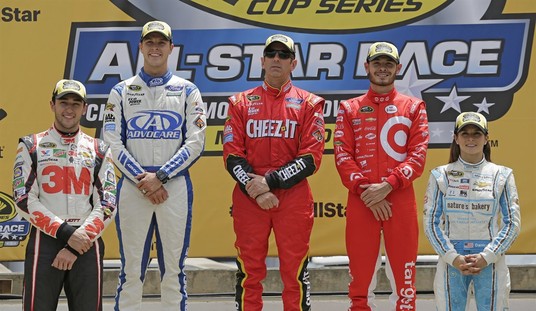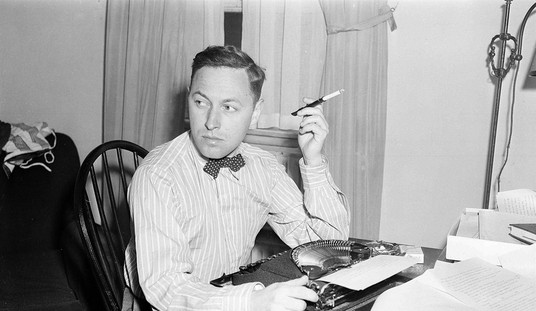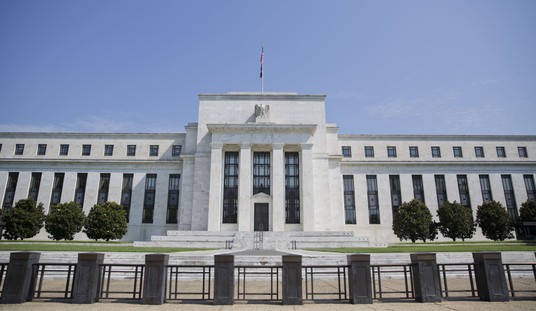At the start of 2009, I warned “Uh Oh — I Smell Yet Another Pathetic Gatsby Remake.” Sadly, I may have been all too prescient:
As Tom Shillue wrote at the time at Big Hollywood:
According to this story in the Guardian, Hollywood is geared up and ready for the recession, and it seems they are eager to entertain us with a series of big-budget “I told you so’s”.
Baz Luhrmann is all set to mount a re-make of The Great Gatsby because, according to him, “People will need an explanation of where we are and where we’ve been, and The Great Gatsby can provide that explanation.”
Oh, boy. Here we go again. Do I really need another lesson in why the American dream is a charade, and our materialism leads to emptiness and despair? I’ve heard this all before.
The time it takes to complete a film can do strange things to its message. What might have seemed like a warning about economic excess at the start of the Obama administration can now be viewed by many as a cautionary tale about the identikit persona of Mr. Obama himself, and a reminder of the blindness of those who eagerly followed him. Regarding the former, Mark Steyn wrote in his latest column:
“I suppose he’d had the name ready for a long time, even then,” says Nick Carraway in “The Great Gatsby.” “His parents were shiftless and unsuccessful farm people – his imagination had never really accepted them as his parents at all. The truth was that Jay Gatsby of West Egg, Long Island, sprang from his Platonic conception of himself… . So he invented just the sort of Jay Gatsby that a seventeen-year-old boy would be likely to invent, and to this conception he was faithful to the end.”
In a post-modern America, the things that Gatsby attempted to fake – an elite schooling – Obama actually had; the things that Gatsby attempted to obscure – the impoverished roots – merely add to Obama’s luster. Gatsby claimed to have gone to Oxford, but nobody knew him there because he never went; Obama had a million bucks’ worth of elite education at Occidental, Columbia and Harvard Law, and still nobody knew him (“Fox News contacted some 400 of his classmates and found no one who remembered him”). In that sense, Obama out-Gatsbys Gatsby: His “shiftless and unsuccessful” relatives – the deportation-dodging aunt on public housing in Boston, the DWI undocumented uncle, the $12-a-year brother back in Nairobi – are useful props in his story, the ever more vivid bit-players as the central character swims ever more out of focus, but they don’t seem to know him either. The more autobiographies he writes, the less anybody knows.
Like Gatsby presiding over his wild, lavish parties, Obama is aloof and remote: let everyone else rave deliriously; he just has to be. He is, in his way, the apotheosis of the Age of American Incredibility. When just being who you are anyway is an incredible accomplishment, Obama managed to run and win on biography almost entirely unmoored from life. But then, like Gatsby, he knew a thing or two about “the unreality of reality.”
To borrow from one of Gatsby’s most famous scenes, the shirts have no emperor. Though one huge difference: attendance at Gatsby’s wild parties was entirely voluntary. We’re all trapped in Obama’s cocktail party until at least November. And whatever happens then, we’ll be working off the hangover for quite some time to come.
But back to the film itself. My first thought while watching the above trailer was, to paraphrase the perceptive veteran film critics Beavis and Butt-head, this really sucks — but it sucks in unique ways we’ve never seen before. Or actually, we have; the same problems that plague Martin Scorsese’s The Aviator — killer production design, great wardrobe, phony looking CGI, and the same unbelievable lead are at work here as well. Here’s what I wrote in 2005:
Over the summer, I finally caught The Aviator. Wonderful 1930s and ’40s production design, but its casting reminded me why I skipped it on the big screen in the first place. There was simply no way I could buy the babyfaced perpetual child-man Leonardo DiCaprio as business tycoon Howard Hughes. He simply lacked the gravitas to play the character, despite the fact that at 30, DiCaprio is only a few years younger than Hughes himself was at the start of the era depicted in Scorsese’s picture.
(Incidentally, could you imagine DiCaprio as the title character in Citizen Kane? And yet Orson Welles was actually four years younger than DiCaprio when he played Charles Foster Kane.)
It isn’t entirely DiCaprio’s fault; just about every Hollywood period movie made post-Brat Pack suffers from the same problem. (For example, the Dorthy Parker film from 1994 with Jennifer Jason Leigh in the title role, Mrs. Parker and the Vicious Circle, comes immediately to mind. At least in Titanic, DiCaprio and Kate Winslet were supposed to be callow youths, and were surrounded by an army of veteran character actors.)
Back in 2005, Frederica Mathewes-Green had a brilliant essay which summed up why today’s actors often aren’t believable as grown-ups, a problem exacerbated in a period movie:
I’m a fan of old movies, the black-and-whites from the 1930s and 1940s, in part because of what they reveal about how American culture has changed. The adults in these films carry themselves differently. They don’t walk and speak the way we do. It’s often hard to figure out how old the characters are supposed to be—as though they were portraying a phase of the human life-cycle that we don’t have any more.Take the 1934 film Imitation of Life. Here Claudette Colbert portrays a young widow who builds a successful business. (Selling pancakes, actually. Well, it’s more believable if you see the whole movie.) She’s poised and elegant, with the lustrous voice and magnificent cheekbones that made her a star. But how old is she supposed to be? In terms of the story, she can’t be much more than thirty, but she moves like a queen. Today even people much older don’t have that kind of presence—and Colbert was thirty-one when the movie came out.
How about Clark Gable and Jean Harlow, smoldering away in Red Dust? They projected the kind of sexiness that used to be called “knowing,” a quality that suggested experienced confidence. When the film came out Gable was thirty-one and Harlow ten years younger. Or picture the leads of The Philadelphia Story. When it was released in 1940, Katharine Hepburn was thirty-three, Cary Grant thirty-six, and Jimmy Stewart thirty-two. Yet don’t they all look more grownup than actors do nowadays?
Characters in these older movies appear to be an age nobody ever gets to be today. This isn’t an observation about the actors themselves (who may have behaved in very juvenile ways privately); rather, it is about the way audiences expected grownups to act. A certain manner demonstrated adulthood, and it was different from the manner of children, or even of adolescents such as Judy Garland and Mickey Rooney.
Today actors preserve an unformed, hesitant, childish quality well into middle age. Compare the poised and debonair Cary Grant with Hugh Grant, who portrayed a boyish, floppy-haired ditherer till he was forty. Compare Bette Davis’ strong and smoky voice with Renée Zellweger’s nervous twitter. Zellweger is adorable, but she’s thirty-five. When will she grow up?
In a review in the Village Voice of the film The Aviator, Michael Atkinson dubbed our current crop of childish male actors “toddler-men.” “The conscious contrast between baby-faced, teen-voiced toddler-men movie actors and the golden age’s grownups is unavoidable,” he wrote. “Though DiCaprio is the same age here as Hughes was in 1934, he may not be convincing as a thirty-year-old until he’s fifty.” Nobody has that old-style confident authority any more. We’ve forgotten how to act like grownups.
Perhaps though, I’m in the curmudgeonly minority on this one. (Certainly wouldn’t be the first time; you get used to it as you get older.) At Ricochet, Emily Esfahani Smith writes that she enjoyed the new trailer very much:
Fitzgerald embodied the excesses of the Jazz Age, excesses that Luhrmann’s trailer captures perfectly. And even though Luhrmann opts for hip hop rather than jazz as background music–which has already become a source of comment and consternation–the two are close substitutes: jazz, in the twenties, was considered hot, morally degenerate, and libertine. And, to a certain audience, the same can be said of hip hop today.
The movie is scheduled to hit theaters on Christmas Day. I, for one, cannot wait.
I’m pretty sure I can — in the meantime though, for those with Amazon Prime and Roku, the Redford version of The Great Gatsby is currently available free in HD. Great production, but the costumes by Ralph Lauren are better suited to 1974 than 1924 (all those wide ties and wide lapels), too bad about the lethargic pacing and somnambulistic performance by Redford as Gatsby.
Perhaps The Great Gatsby is one of those novels where the writing transcends the story and plot, making a quality cinematic version remarkably difficult; the 1949 Alan Ladd version creaked pretty badly as well, as I mentioned last year at the PJ Lifestyle blog. It’s not out on DVD, but the whole thing is on YouTube.
Related: Alpha versus Beta.
Update: At Ricochet, Ben Domenech links to our post above with a similar reaction to what he describes as “The Great Gatsby’s Horrific Trailer.” “Ed Driscoll worries that he’s being a curmudgeon compared to Emily’s positive take on the new trailer. As for me, I think it is a tinsel-strewn cinematic abortion….I am sure when you first read [Gatsby], you thought: ‘This Gatsby thing is pretty great, but what it really needs is dubstep and 3D.’ Am I right?”
Do all Fitzgerald movies require music from the era they were produced in? We would have been treated to Led Zeppelin scoring Robert Evans’ mid-’70s version. (Wait, has anybody tried syncing it up to Pink Floyd’s Dark Side of the Moon yet…?)
Say what you will about the Redford/Robert Evans version, nobody ever described it as “Visual Cheez-Whiz.”
One More: James Lileks devotes his latest Bleat to the new trailer (and some of the small wonders hidden within the film’s otherwise gratuitous CGI effects), and notes:
The truth of the American experience is not found in a cypher like Gatsby, but the millions of people who moved out and moved up and found themselves in a better place – the story, in other words, of everyone in my parents’ families. No one had a Long Island mansion, but compared to a shack by the river with rats? A rambler in the new development and a car in the driveway and a business of your own, or a job with the city running the municipal garage, or a job flying jets for an airline, or any of the other things my aunts and uncles did – that’s far more impressive than anything Gatsby did.
In other words, the audience, which much of Hollywood holds in contempt, especially for its rampant consumerism — such as buying the latest director’s cut edition DVD…










Join the conversation as a VIP Member